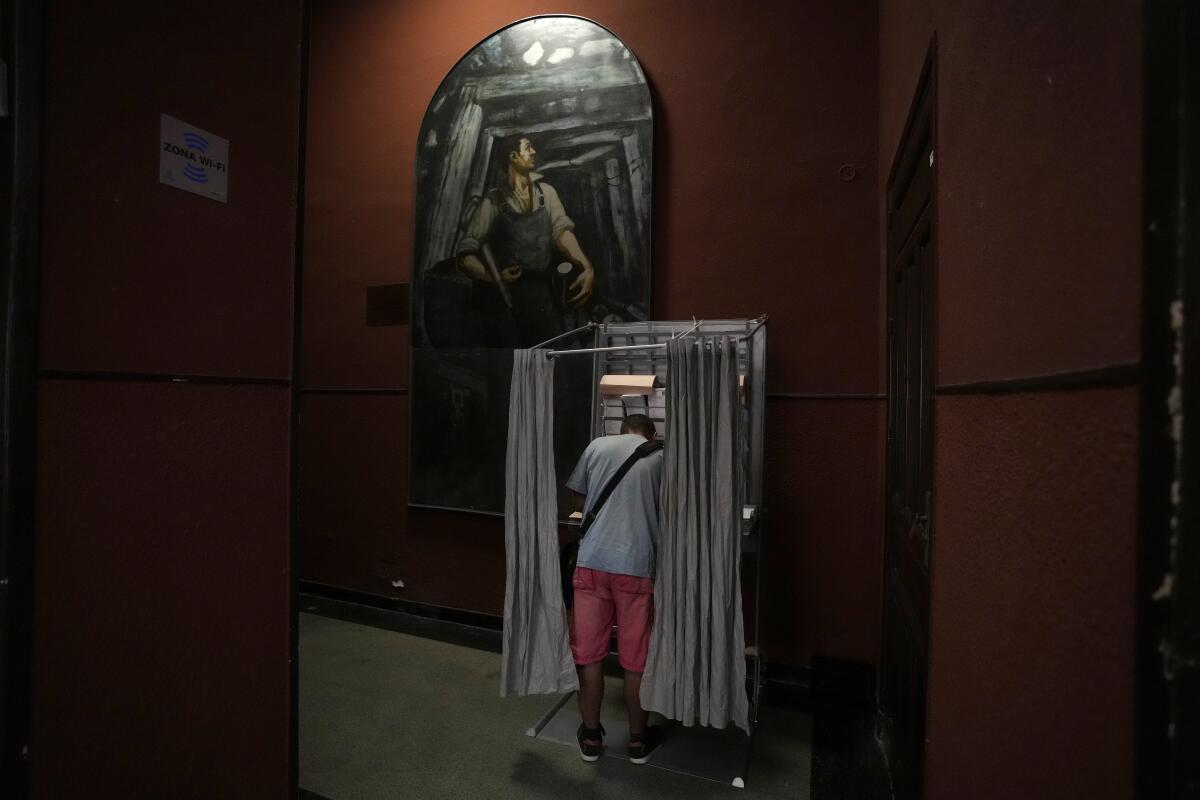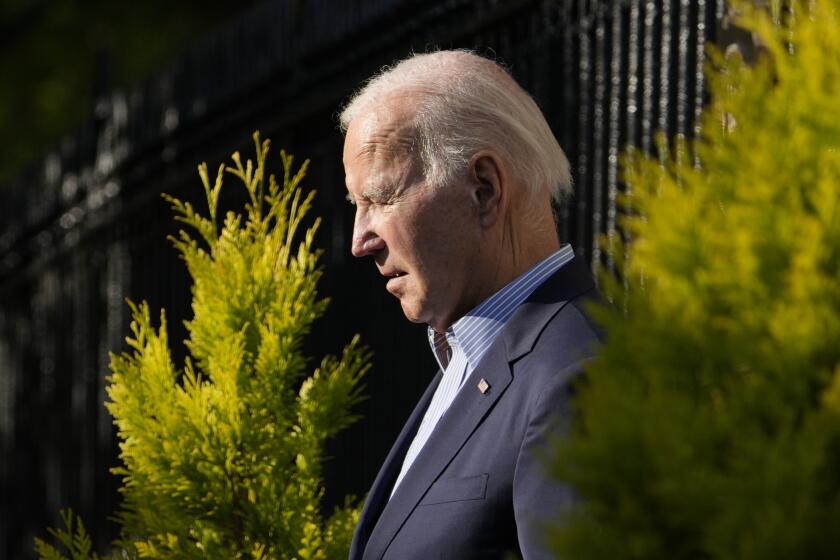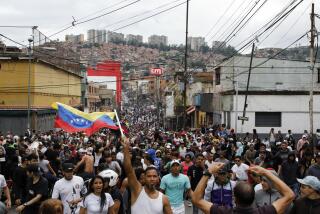Spain at risk of political deadlock after Conservative party fails to topple Prime Minister Sánchez

- Share via
MADRID — Spain appears headed for political gridlock after Sunday’s inconclusive national elections left parties on both the right and left without a clear path toward forging a new government.
The conservative Popular Party won the elections, but it fell short of its hopes of scoring a much bigger victory and forcing the removal of Socialist Prime Minister Pedro Sánchez. Instead, the party led by candidate Alberto Núñez Feijóo performed below expectations of most of the campaign polls.
Even though Sánchez’s Socialists finished in second place, they and their allied parties celebrated the outcome like a victory because their combined forces gained slightly more seats than the Popular Party and the far right. The bloc that could probably support Sánchez totaled 172 seats; the right bloc behind Feijóo, 170.
“It was a Pyrrhic victory for the Popular Party, which is unable to form a government,” said political analyst Verónica Fumanal, adding that the conservatives will have to reach out to the far right, and that even then it won’t be enough. “I see a deadlock scenario in the parliament.”
The closer-than-expected election was likely to produce weeks of political jockeying and uncertainty over the country’s future leadership. The next prime minister would be voted on once lawmakers are installed in the new Congress of Deputies, the lower house of parliament.
But the chances of Sánchez of picking up the support of 176 lawmakers in the 350-seat Congress needed to form a government are not great either. The divided results has made the hard-line separatist Together for Catalonia party Sánchez’s potential kingmaker. If the party asks for a referendum on independence for northeast Catalonia, that would probably be far too costly a price for Sánchez to pay.
“We won’t make Pedro Sánchez PM in exchange for nothing,” Míriam Nogueras of Together for Catalonia said after the results left her party holding the keys to power.
With 98% of votes counted, the Popular Party is on course for 136 seats. Even with the 33 seats that the far-right Vox party is poised to get and the one seat set for a minor party that aligns itself with the Popular Party, the total (170) would still not be enough.
The Socialists are set to take 122 seats, two more than they had. But Sánchez can probably call on the 31 seats of its junior coalition partner Sumar and those of several smaller parties to at least total more than the sum of the right-wing parties.
“Spain and all the citizens who have voted have made themselves clear. The backward-looking bloc that wanted to undo all that we have done has failed,” Sánchez told a jubilant crowd gathered at the Socialists’ headquarters in Madrid.
A White House official says President Biden will establish a national monument honoring Emmett Till and his mother, Mamie Till-Mobley.
After his party took a beating in regional and local elections in May, Sánchez could have waited until December to face a national vote. Instead, he stunned his rivals by moving up the vote in hopes of gaining a bigger boost from his supporters.
Even if this goes to a new ballot, Sánchez can add this election night to yet another comeback in his career that has been built around beating the odds. The 51-year-old Sánchez had to mount a mutiny among rank-and-file Socialists to return to heading his party before he won Spain’s only no-confidence vote to oust his Popular Party predecessor in 2018.
Feijóo would probably trade spots with his rival if he could.
Feijóo focused the Popular Party’s campaign not on what he would do as prime minister, but rather as an attack on the last trustworthiness of Sánchez. The strategy failed. The Socialists and other leftist parties seem to have motivated their voters by drumming up fear of having the anti-feminist, ultranationalist Vox in power as a junior member of a possible coalition with the Popular Party.
A Popular Party-Vox government would have meant another European Union member has moved firmly to the right, a trend seen recently in Sweden, Finland and Italy. Countries such as Germany and France are concerned by what such a shift would portend for EU immigration and climate policies.
The election took place at the height of summer, with millions of voters likely to be vacationing away from their regular polling places. However, postal voting requests soared.
Coming on the tail of a month of heat waves, temperatures were expected to average above 95 degrees, above normal in many parts of the country. Authorities distributed fans to many of the stations.
“We have the heat, but the right to exercise our vote freely is stronger than the heat,” Rosa Maria Valladolid-Prieto, 79, said in Barcelona.
Sánchez was one of the first to vote, casting his ballot in a polling station in Madrid.
Commenting later on the large number of foreign media covering the election, he said: “This means that what happens today is going to be very important not just for us but also for Europe, and I think that should also make us reflect.
“I don’t want to say I’m optimistic or not. I have good vibrations,” Sánchez said.
Sánchez’s government has steered Spain through the COVID-19 pandemic and dealt with an inflation-driven economic downturn made worse by Russia’s invasion of Ukraine.
But his dependency on fringe parties to keep his minority coalition afloat, including the separatist forces from Catalonia and the Basque Country, and his passing of a slew of liberal-minded laws put his job at risk.
The right-wing parties vow to roll back dozens of Sánchez’s laws, many of which have benefited millions of citizens and thousands of companies.
More to Read
Sign up for Essential California
The most important California stories and recommendations in your inbox every morning.
You may occasionally receive promotional content from the Los Angeles Times.











